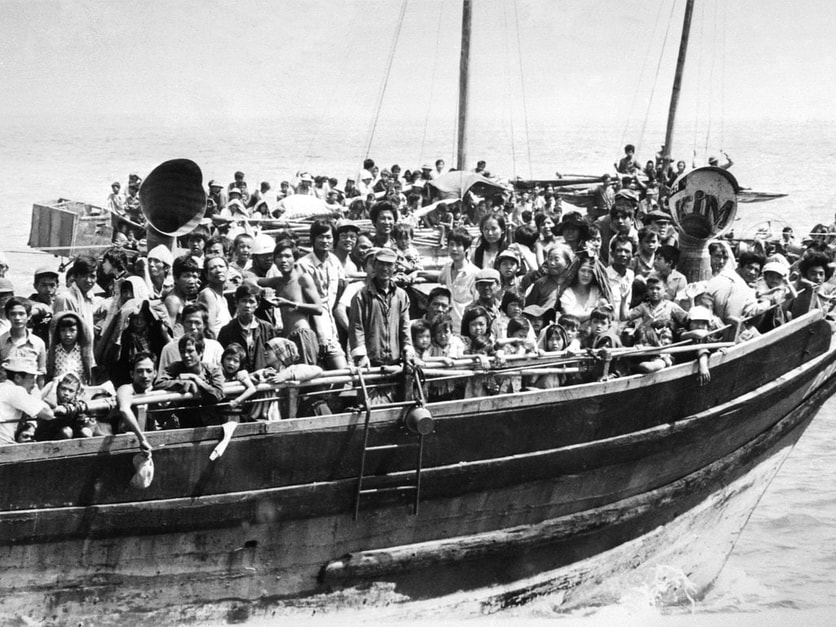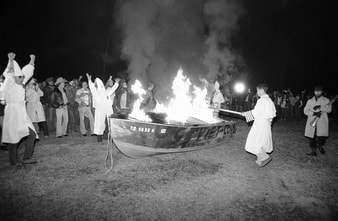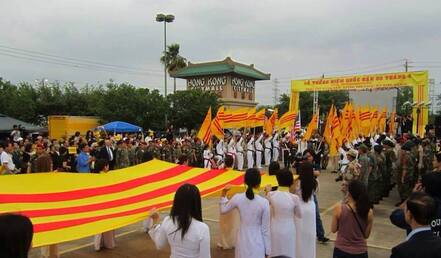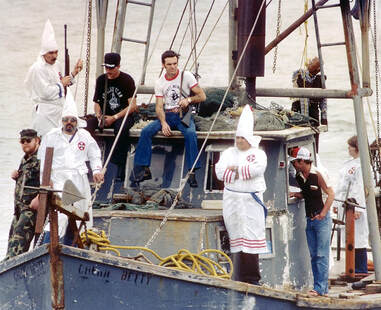|
Forty years ago today... Vietnamese fishermen were at the center of a court victory against the Knights of the Ku Klux Klan. When thousands of Vietnamese refugees resettled in America after the fall of Saigon, many faced hostility from local, predominantly white communities. Tensions turned violent in Galveston, Texas, culminating in a ground-breaking civil suit brought by the Vietnamese Fishermen’s Association (VFA) against white supremacy. Read more to learn about how the case touches on issues at the intersection of civil rights, human rights, and immigrant rights, and ways to teach this case in your classroom! During and after the Vietnam War, over 200,000 refugees resettled in the United States, fleeing Communist reeducation camps, famine, and poverty in their homeland. Many settled in the Galveston Bay area near Houston, Texas to work in the shrimping and fishing industry. While the earliest refugees were often high-ranking professionals and immigrated under President Ford’s 1975 Migration and Refugee Assistance Act, thousands of poorer refugees fled to America by boat. An estimated 200,000 to 400,000 people died tragically on these boat journeys. The plight of the “boat people” prompted President Jimmy Carter to pass the Refugee Act in 1980, which allowed for refugee exceptions to the 1965 Immigration Act’s visa quotas, and established a formal system for resettlement in the United States.  COR/AFP/Getty Images COR/AFP/Getty Images Hostilities grow as Vietnamese enter the fishing industry Many Vietnamese migrants in Galveston struggled financially to pool resources to build boats and materials from the ground up. While they eventually established their place in the market, they were not welcomed by local white fishermen, who perceived the Vietnamese as an economic threat. The hostility toward Vietnamese refugees was bolstered by a belief that immigrants unfairly received extra help from the federal government, part of a growing stigma against government assistance and social safety nets leading up to the Reagan Administration. Long-standing tropes were present here: fear of competition from immigrants, distrust in the racial “other,” and a dislike of government-assisted programs by white Americans, who believed their tax money was not being used for their benefit. Furthermore, the migration of Vietnamese people followed the rise in immigration from Mexico after the passage of the Immigration Act of 1965, fueling more xenophobia. The backlash Vietnamese refugees faced also reveals the damaging trope of the model minority, creating perceptions of refugees as a threat and undeserving of support. As author Stephanie Hinnershitz put it, “whereas many Americans praised Asian Americans for their assumed work ethic, that same characteristic and stereotype made life difficult for the Vietnamese in the Texas fishing industry, proving that hard work and the model minority identity could only go so far.”  (AP/Ed Kolenovsky) (AP/Ed Kolenovsky) Unwelcome competition comes to a head In 1979, tensions reached a critical point when a white fisherman, Rudy Aplin, was shot during an altercation with two Vietnamese fishermen, Chinh Van Nguyen and Sau Van Nguyen, in Seadrift, Texas. The Nguyen brothers were ultimately acquitted on grounds of self-defense, but the event spurred white fishermen to rally together with the Knights of the KKK to “reclaim this country for white people.” In February and March of 1981, armed Klansmen coasted the Galveston bay in “boat parades,” threatening the lives of the local Vietnamese community with intimidation tactics like burning boats, openly displaying weapons, and hanging a disturbing effigy of a Vietnamese fisherman. The Knights also created the Texas Emergency Reserve, a group of secret paramilitary camps in the nearby area that trained in guerrilla tactics. During the parades, Louis Beam, head of the Klan, delivered speeches animated with racist and pro-American rhetoric. It was here that he coined the violent catchphrase, “Where ballots fail, bullets will prevail.”  Vietnamese Community of Houston and Vicinities (VNCH) Vietnamese Community of Houston and Vicinities (VNCH) Taking the case to court In response to the Klan-led parades, the Vietnamese Fishermen’s Association filed a class action civil lawsuit on April 16, 1981, with the help of the Southern Poverty Law Center (SPLC). Lawyers at the SPLC argued that the Klan violated several civil rights statutes, the 13th and 14th Amendments, common law torts on assault and personal property, the Sherman Antitrust Act, and a little-known Texas law prohibiting the establishment of private armies. Lawyers for the Klan asked the assigned judge, Gabrielle McDonald, to step down, arguing that because she was African American she would not be impartial in the case. Judge McDonald refused. On July 15th, 1981, the Southern District Court of Texas ruled in the VFA’s favor, issuing a preliminary injunction that brought the intimidation tactics to a halt. Less than a year later, on June 9, 1982, the court issued a final order and permanent injunction against Louis Beam, the Knights of the KKK, and the American Fishermen’s Association, who were permanently prohibited from committing actions that comprised the terror campaigns. The court reasoned that the defendants deprived the Vietnamese of equal protection under the law, pursuant to section 1981 of the Civil Rights Act. Furthermore, in a novel use of the Sherman Antitrust Act, which aimed to outlaw monopolistic business practices, the court also reasoned that the Klan’s actions intended to eliminate a class of competitors and constituted an unreasonable attempt to restrain trade. The legacy of VFA vs. KKK The Vietnamese Fishermen’s Association case was the first successful litigation case brought under the SPLC’s Klanwatch program, known today as the Intelligence Project. The case, which recognized the Vietnamese refugees’ rightful place in America, was a victory for all refugees against white supremacy and anti-immigration sentiments. Despite the multiple attempts to drive away the Vietnamese fishermen, the community persisted and fought back in court. Today, some 80,000 Vietnamese call Houston and its surrounding areas home, and Little Saigon is integral to the city’s economic and cultural success. Despite a litany of barriers, the Vietnamese community in Greater Houston remains a “vibrant part of the fabric of Texas.” Ways to Incorporate VFA vs. KKK in the ClassroomThis case touches upon a variety of U.S. and World History topics, though it is not taught in most history classes. Here are some ideas, guiding questions, and additional resources to help you incorporate the case into the classroom.
Discussion Questions:
Digital Media and Primary Sources
Further Reading
Written by Karen Cheng, Summer 2021 Intern
7 Comments
Pinoy TV provides pinoys the opportunity to enjoy watching their favorite MAGANDANG BUHAY. So, if you’ve missed few episodes from your favorite show, don’t worry, as you can find all the episodes on our site.Through the use of the newest technology and Internet, various TV shows of TV5 and GMA 7 could be replayed anywhere and anytime.
Reply
7/7/2022 01:32:00 pm
Stereotype made life difficult for the Vietnamese in the Texas fishing industry, proving that hard work and the model minority identity could only go so far. Thank you for sharing your great post!
Reply
9/19/2022 01:02:14 pm
Whereas many Americans praised Asian Americans for their assumed work ethic, that same characteristic and stereotype made life difficult for the Vietnamese in the Texas fishing industry, proving that hard work. I truly appreciate your great post!
Reply
10/4/2022 02:40:42 pm
The Knights also created the Texas Emergency Reserve, a group of secret paramilitary camps in the nearby area that trained in guerrilla tactics. Thank you for sharing your great post!
Reply
3/15/2023 02:39:19 pm
Their assumed work ethic that same characteristic and stereotype made life difficult for the Vietnamese in the Texas fishing industry, proving that hard work and the model minority identity could only go so far. Thank you for making this such an awesome post!
Reply
Leave a Reply. |
Read about the latest updates on the Immigrant History Initiative's projects.
Archives
July 2021
Categories
All
|
|
Copyright 2021, Immigrant History Initiative Incorporated. View our Terms of Use here.


 RSS Feed
RSS Feed
